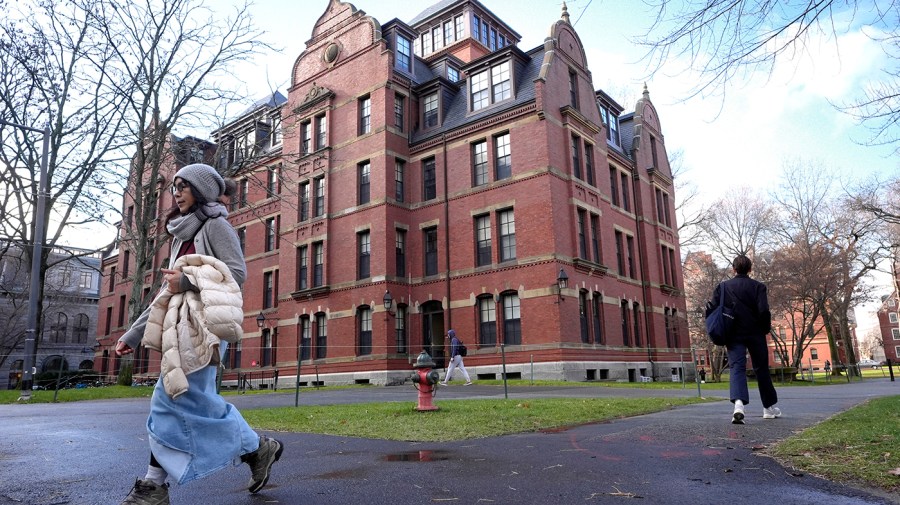
Colleges and universities are preparing for new legal and political territory as President-elect Trump returns to office.
Concerns for international students, GOP attacks on higher education and increased protests on campus are just some of the worries on administrators’ minds.
“I think we’re obviously preparing,” said Todd Wolfson, national president of American Association of University Professors. “It’s a new legal terrain, it’s a new political terrain for higher education and for universities and colleges. And certainly, the Trump administration has signaled that they are going to engage colleges and universities in a different manner.”
One of the pillars of Trump’s 2024 campaign was a pledge for the largest mass deportation effort in history, which could hit both the student and staffer populations of colleges. He has vowed to target undocumented individuals and potentially go after the legal status of many currently in the nation in accordance with the law, including those with with Temporary Protected Status or student visas.
But if they are considering moves to help shield their students from deportation, schools are keeping quiet about them. The Hill has reached out to more 30 colleges and universities about potential plans for if Trump targets college students with his immigration efforts, and none have offered comment.
And it’s not just international students who could be at risk, as Trump has previously threatened to target those in the Deferred Action for Childhood Arrivals (DACA) program, though he has also expressed a willingness to make a deal to allow them to stay in the country.
“For our DACA students, many of our institutions were encouraging those with DACA to renew their registration,” said Sarah Spreitzer, vice president and chief of staff of government relations at the American Council on Education.
Schools are also haunted by the memory of Trump’s “Muslim ban” on international travel from his first term and have urged foreign students to get back on campus before his inauguration and the potential enactment of new restrictions.
The United States saw more than a million international students come to universities in the 2023-2024 year — a record — with India overtaking China as their No. 1 country of origin.
“Unfortunately, the first travel ban caused a lot of chaos as they were trying to implement it immediately after it was issued, and so many of our students were caught up in the mess,” Spreitzer said.
“I think that many of our institutions are playing it safe. I would say that they want international students to be back on campus by January 20, because we don’t know what’s going to be included in that travel ban […] But what I’ve been telling my institutions is that students were never directly targeted under the travel bans,” she added.
The Trump world has also made H1-B visas, which U.S. corporations use to hire foreign workers for certain positions, a hot topic of debate. While universities are exempt from H1-B caps that are placed on other industries, that status could now be up for discussion.
In his time out of office, Trump has not toned down his rhetoric against institutions of higher learning, including threatening funding for schools with diversity, equity and inclusion measures, saying he will “take away their endowments, and they will pay us billions and billions of dollars for the terror they have unleashed into our once-great country.”
Another concern regards accreditation, the process that approves universities and grants them federal funding — and a new target for Republicans.
Back in September, Trump said schools could lose accreditation over “antisemitic propaganda,” although how antisemitism is defined has been a huge debate at colleges over the past year.
“I have a concern that the Trump administration will actually go after accreditation and try to politicize what has been a non-political body,” said Wolfson. “And so, I can imagine them coming in and trying to change accreditation […] and set standards and say that if you teach critical race theory, you are not to be accredited.”
Colleges don’t only have to prepare for what the Trump administration will do, but also for how their students will react.
Campus protests have been a huge issue over the past year, with demonstrations against the Israel-Hamas war shutting down classes and leading to cancellations of commencements last spring.
Trump has also specifically threatened to go after the student visas of pro-Palestinian protesters.
While universities have changed some of their rules around campus protests, such as mandating no encampments or no amplified noise after a certain time, tensions on campuses are high and could get worse under Trump
“I do expect that we might see increased protests on campus for all sorts of things,” Wolfson said.
“I think we would be surprised if we didn’t see young people protesting different aspects of the incoming administration. And I do think that both our campuses and how our administrations deal with that, and then also how the federal administration, the incoming Trump administration, deals with that part, is concerning,” he added.












